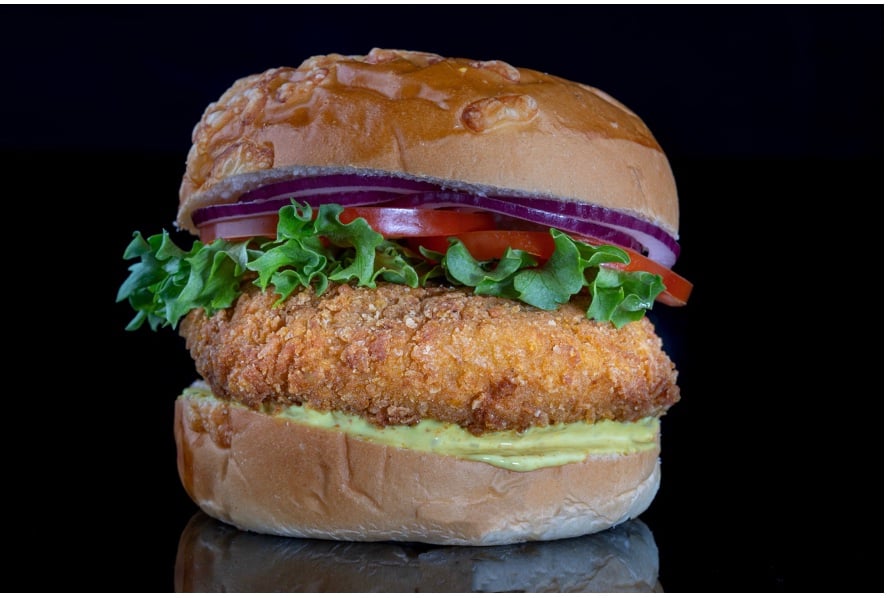
Plant-based hybrid chicken burger (Image courtesy of MeaTech 3D Ltd.)
A Happier Medium Between Plant-Based Alternatives and Meat
Hybrid meat represents a middle ground between plant-based alternatives and meat. It is not a new idea and yet, at the same time, it is still relatively underrepresented in the market. This makes sense when comparing it to 100% plant-based meat-substitute products from companies like Beyond Meat and Impossible Meat who have had a wide appeal among not only vegans and vegetarians but also flexitarians, the largest by far of these three segments. Flexitarians are drawn to plant-based meat alternatives because they are meat lovers looking to reduce their meat intake for health, moral or ethical reasons or all of the above.
The market opportunity for hybrid meat substitutes lies mostly with this group, who because of their affinity for meat, might prefer a plant-based product with an added boost of real meaty flavor and texture. If you replace conventional meat with cultured meat in the same product concept, you remove the moral, ethical and environmental drawbacks of using farmed animals and potentially create more universal appeal for the category.
Could Hybrid Meat Substitutes with Cultured Meat Be a Game Changer?
Peace of Meat, a subsidiary of international deep-tech food company MeaTech 3D Ltd. and leading developer of cultured avian biomass, has built an innovative cell platform for industrialized cultured meat production. The platform allows the company to use stem cells, cell media and clean energy to sustainably grow avian fat cells and muscle cells in bioreactors.
Peace of Meat’s avian cell line was established in September of 2021 when they successfully produced 700 grams of cultured chicken fat biomass in a single production run at their R&D facility. Several tastings this year hosted by MeaTech have yielded overwhelmingly positive feedback.
Peace of Meat recently announced a partnership with Scotland-based ENOUGH, a leader in mycoprotein. Mycoprotein is a fungi-based ingredient rich in fiber and protein content and low in fat. The goal of the partnership is to produce 100% non-GMO hybrid food products that are microcarrier free. The combination of a highly nutritious, protein-rich non-meat ingredient and cultured avian fat and muscle biomass, which will provide authentic meat flavors and texture, could potentially represent the beginning of a paradigm shift as a new food category emerges within the hybrid meat substitute market.
Production and Commercialization of Cultured Avian Biomass
Scaled-up production of Peace of Meat’s avian biomass is set for 2023. The company is planning construction of a pilot plant and R&D facility in Belgium and has already invested close to $7.5 million in cultured avian technology development. They are currently working on obtaining the necessary regulatory approval for their products and planned facility.
A Booming Plant-Based Market That Could Take Hybrid Cultured Meat Along for the Ride
Bloomberg Intelligence released research in late 2021 that showed that the plant-based industry was expected to see rapid growth in the coming decade. The report, titled Plant-Based Foods Poised for Explosive Growth, publicized their findings of a market that could reach $162 billion by 2030, a 558% increase from 2020. A company like Peace of Meat and its parent company MeaTech should be able to capitalize on the global growth of plant-based meat alternatives, a market with a consumer base that shares the same concerns for sustainability issues.
Peace of Meat and MeaTech are targeting 15% of the total addressable market. Peace of Meat’s move toward commercialization will play a crucial role toward this goal as alternative chicken and bovine products are forecasted to make up 60% of the market by 2025. The additional resources available via Peace of Meat’s parent company and its partnership with ENOUGH signal even greater potential for the future.
Disclaimer: The author was compensated to provide his independent analysis of the company. The author owns no shares nor plans to do so in the near future. The stock market is volatile and investors are advised to do their own research prior to making a decision
Advertising disclosure: We may receive compensation for some of the links in our stories. Thank you for supporting LA Weekly and our advertisers.
